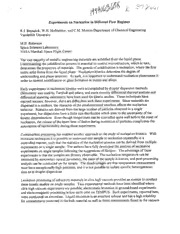
NASA Technical Reports Server (NTRS) 20000025444: Experiments on Nucleation in Different Flow Regimes PDF
Preview NASA Technical Reports Server (NTRS) 20000025444: Experiments on Nucleation in Different Flow Regimes
Experiments on Nucleation in Different Flow Regimes R.J. Bayuzick, W.H. Hofmeister, and C.M. Morton Department of Chemical Engineering Vanderbilt University M.B. Robinson Space Sciences Laboratory NASA Marshall Space Flight Center The vast majority of metallic engineering materials are solidified from the liquid phase. Understanding the solidification process is essential to control microstructure, which in turn, determines the properties of materials. The genesis of solidification is nucleation, where the first stable solid forms from the liquid phase. Nucleation kinetics determine the degree of undercooling and phase selection. As such, it is important to understand nucleation phenomena in order to control solidification or glass formation in metals and alloys. Early experiments in nucleation kinetics were accomplished by droplet dispersion methods. Dilitometry was used by Yurnbull and others, and more recently differential thermal analysis and differential scanning calorimetry have been used for kinetic studies. These techniques have enjoyed success; however, there are difficulties with these experiments. Since materials are dispersed in a medium, the character of the emulsion/metal interface affects the nucleation behavior. Statistics are derived from the large number of particles observed in a single experiment, but dispersions have a finite size distribution which adds to the uncertainty of the kinetic determinations. Even though temperature can be controlled quite well before the onset of nucleation, the release of the latent heat of fusion during nucleation of particles complicates the assumption of isothermality during these experiments. Containerless processing has enabled another approach to the study of nucleation kinetics. With levitation techniques it is possible to undercool one sample to nucleation repeatedly in a controlled manner, such that the statistics of the nucleation process can be derived from multiple experiments on a single sample. The authors have fully developed the analysis of nucleation experiments on single samples following the suggestions of Skripov. The advantage of these experiments is that the samples are directly observable. The nucleation temperature can be measured by noncontact optical pyrometry, the mass of the sample is known, and post-processing analysis can be conducted on the sample. The disadvantages are that temperature measurement must have exceptionally high precision, and it is not possible to isolate specific heterogeneous sites as in droplet dispersions. Levitation processing of refractory materials in ultra high vacuum provides an avenue to conduct these kinetic studies on single samples. Two experimental methods have been identified where ultra high vacuum experiments are possible; electrostatic levitation in ground-based experiments and electromagnetic processing in low earth orbit on TEMPUS. Such experiments, reported here, were conducted on zirconium. Liquid zirconium is an excellent solvent and has a high solubility for contaminants contained in the bulk material as well as those contaminants found in the vacuum environment.Oxides,nitrides,andcarbidesdonotexistinthe melt, and do not form on the surface of molten zirconium, for the materials and vacuum levels used in this study. Ground-based experiments with electrostatic levitation have shown that the statistical nucleation kinetic experiments are viable and yield results which are consistent with classical nucleation theory. The advantage of low earth orbit experiments is the ability to vary the flow conditions in the liquid prior to nucleation. The put-pose of nucleation experiments in TEMPUS was to examine
